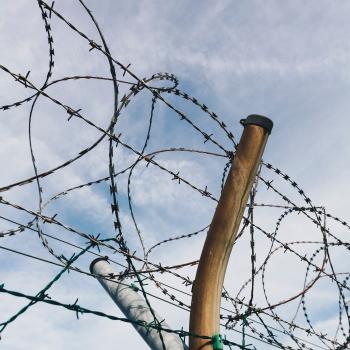Last Sunday in church I began to have thoughts I had not had before. I began to wonder what I would do if a gunman came into the sanctuary and started to kill us. Would I be able to reach my kids in time? Could I protect my wife if necessary? What sort of security does our church have in case such violence comes to my place of worship? Disturbing thoughts but also the price of living in 2020 America.
Am I being paranoid? After all, while church shootings happen, they are not an everyday occurrence. But I am aware of the two recent mass shootings where the shooters went to area with a lot of people crowded together. If one wants to maximize a kill total, a church does seem like an inviting target. Maybe my fear was unreasonable, but it was hard to get away from it.
But more depressing than my fear is the realization that we are not going to solve our problems of mass shooting or even violence in general. We are too polarized to solve this problem. Instead, like almost every other issue that comes up, instead of solving this problem we will merely use it to either defend our own vested interest or to attack our political opponents.
We all know the ritual right now. After a mass shooting those on the left immediately complain about the lack of gun control. They talk as if we all know that gun control will solve our gun violence problem. So, anyone who says otherwise either does not care about mass murder or is being paid off by the NRA. They may also throw in some concerns about white supremacy, but otherwise the solution is getting rid of guns.
The reaction of the right is just as predictable. Gun control will have no impact on violence. It will only take away the rights of law-abiding citizens to protect themselves. They bring up other sources of violence such as mental health, violent entertainment, video games, alienation, failing families and such. But according to them, gun control reforms are unnecessary and a violation of our rights.
As one who stands outside of both the left and the right, it is clear to me that both are right, and both are wrong. Yeah, we need to look at how guns enhance our potential of violence. We need to look at common sense reforms to reduce their impact on our society. I do not favor gun bans because I, as a 6’3” man, do not have the right to tell some 5-foot woman that she cannot have a gun to protect herself. But she does not need high capacity rounds for that protection, does she?
The right is correct in that there are more factors than guns that are tied to our violence. Gun control by itself will not end this violence. If we do not address issues of culture, bullying, mental health and family dissolution, then we will have limited success in dealing with violence in our society. The left’s myopic view of gun control and the magic solution fail us.
But the right simply refuses to accept the reality that guns allow us to kill many people faster than we ever have before. We have always had sick people who wanted to hurt others. But they never had the ability to kill more than a few people at a time. And unless they were able to go undetected for a long period of time, their ability to murder was limited. Today? Las Vegas. The Pulse shooting. And now the shootings in El Paso and Dayton. We can clearly see how dozens of people can be killed in a single setting. Doing something about guns is not a panacea. But it is necessary so that we can limit the damage done when we do have a crazed man who decides to indiscriminately kill.
When insanity happens, we often crave simple answers. We can yell gun control or that the only way to stop a bad man with a gun is with a good man with a gun. Those are partial truths when we are dealing with the complex problem of violence. They make us feel better, but they will not solve the problem.
Take the notion that the way to stop a bad man with a gun is with a good man with a gun. Is that true? Well the shooter in Dayton was killed within a minute of his attack but he killed nine people. Clearly, he would have killed more if good men and women with guns had not taken him out. But he still killed nine people. So, having armed protectors can save some lives but that, by itself, will not end gun violence.
I suspect that this is true with any single factor we attempt to address. Gun control will save some lives, but it will not end gun violence. Dealing better with issues of mental health is likely to stop a shooter or two. But there will be more. Addressing white supremacy will stop some potential murderers. But the Dayton shooter was not a white supremacist, and neither was this shooter (I prefer not to name these killers since I do not want to give them any additional publicity). Addressing family dissolution is an important step for us to take. But it will not solve the problem by itself.
If we are really serious about tackling gun violence, mass shooting and otherwise, then we would want to put together a comprehensive plan to deal with that problem. But to do that we may have to recognize people on the other side of the political spectrum may have a point or two. We must put down our rhetorical weapons so that we can concentrate on solutions instead of political victories.
Do you see any of our current presidential candidates calling us to such a solution? Asking about Trump is a no-brainer. Of course, he only feeds into our polarization. But while Trump makes the problem worse, this polarization predates him, and it will survive him unless we confront it. But I see no evidence that any of the Democratic candidates want to do anything beyond call for gun control and decry white supremacists. Although I am fairly certain that I will vote for the American Solidary Party next year, I would consider a Democratic candidate who honestly suggests that we work together to find a common agenda, instead of merely trying to call us to support politically progressive goals.
Our polarization will kill us. Sometimes it may be with violence. One can say that the El Paso shooter is tied to the right with his anti-immigrant bigotry while the Dayton shooter is tied to the left with his support of Elizabeth Warren. But even if it is unfair to tie these shooters to the different political wings, our polarization helps to create the atmosphere where these types of shooting are possible. That polarization stops us from working together to deal with the multifaceted issue of gun violence.
That polarization also stops us from solving other social problems. Could we solve problems of immigration if we worked together rather than making it a political football? I believe we can. What about the balancing of religious freedom and rights of sexual minorities? What about consideration of prison reform or resourcing anti-poverty program? Could we not find common ground on those issues? To be sure there are issues where the moral differences are so profound, like abortion, where we probably cannot work together to find consensus. But our polarization keeps us divided on too many issues in our society and in the case of gun violence, threatens to kill some of us.
I have skin in the game. I have three young boys that I want to grow up in a society where one half of the country is not dehumanizing the other half of the country. I want them to see a country of individuals working together to overcome their differences so that we can solve our problem. Given what I have seen in this country today, I have little hope that they will get that country. But we must keep working towards that goal or all hope is lost.
Some have complained about how campaign financing or foreign government interference inhibits us from solving our social problems. I think it is much more basic than that. We do not like those on the other side and we refuse to work with them. We would do better to stop looking at others as the source of our dysfunction and ask what we are doing to end the poisonous political and social atmosphere in our country. Maybe then we will be in a position to significantly reduce violence in our society.















